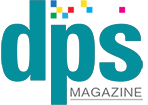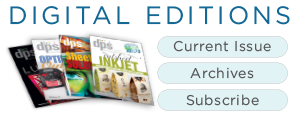By Olivia Cahoon
Finishing equipment is a key component in the digital publishing model, which demands shorter, more frequent jobs in comparison to traditional methods. A variety of finishing equipment is used to produce publications including perfect binders, trimmers, and tools for case making. To keep clients satisfied, print providers look for innovative ways to improve the production process by investing in the latest finishing technologies.
Above: Total Printing Systems of Newton, IL recently printed 1,000 perfect bound books for River Junction Press using the Kodak NexPress SX3300, Screen TruePress Jet520, and Standard Horizon BQ-470 Perfect Binder.
Total Printing Systems
Established in 1973, Total Printing Systems started in Newton, IL as a commercial printer. With two employees, the company produced business cards, letterheads, and forms from a 750 square foot barn. It gradually worked its way into saddle stitching, perfect binding, and adhesive case binding, eventually becoming a complete book manufacturer with nearly all binding styles available in house.
Today, the company has 53 employees and operates in a 45,000 square foot production facility in addition to a 15,000 square foot print-on-demand and fulfillment center. It serves customers nationwide, many of whom take advantage of its Midwest location for shipping and distribution. Total Printing Systems’ customers include government, manufacturers, religious publishers, self-publishers, small presses, trade book publishers, and university presses.
The company started digital printing in the early 1990s with a Xerox DocuTech press and several early digital Océ printers. As a short-run book manufacturer, Total Printing Systems produces a variety of book shapes, sizes, and finishing styles. It mostly serves small- to mid-sized publishers in the education, independent, and religious markets.
Total Printing Systems utilizes two inkjet web presses from Screen Americas—the TruePress Jet520 and TruePress Jet520 EX. The TruePress Jet520 is a full-color variable printing system featuring a roll-fed transport system for high-volume printing. It prints up to 420 feet per minute. It is suitable for a range of paper types including peel-off postcards.
The company uses several toner-based sheetfed devices including a Kodak Nexpress SX300, Konica Minolta bizhub PRESS C1100 and C8000, and several Ricoh 1107EX production printers. “Our digital printing portfolio has changed and grown overtime as different technological breakthroughs became available,” says Rick Lindemann, president, Total Printing Systems. “We’ll be changing and adding new digital presses and capability throughout the next 15 months.”
The print provider selects media based on printing method. From an inkjet standpoint, it runs Mitsubishi’s Sword Gloss stocks and Flambeau River’s Torchglow Opaques. For toner-based output, the company uses a variety of sheets from several manufacturers.
Total Printing Systems uses a PDF workflow and Quite Imposing as well as Impostrip or the front-end software on its presses.
Digital Book Finishing
Digital print technologies help book manufacturers and publishers transition to a printing on demand business model. Digital finishing equipment is needed to reduce bottlenecks in the workflow.
Binding is a critical element of its operation. Lindemann estimates that over 90 percent of Total Printing Systems’ print jobs require some form of bindery. The company has a complete in-house bindery department that includes case binding, lay-flat, loose leaf, mechanical binding, perfect binding, polyurethane reactive (PUR) binding, saddle stitch, and three-hole drilling.
Its digital finishing department consists of a variety of equipment from several manufacturers. The majority is from Standard Finishing including the Horizon BQ-270 EVA Perfect Binder, Horizon BQ-470 Perfect Binder, Horizon HT70 three knife trimmer, Horizon Stitchliner 5500, Hunkeler POPP-6 System, and CABS 400 Perfect Binding System.
In addition, the print provider runs the GP2 SC2 Casemaker, Muller Martini SigmaTrimming Center, On Demand Machinery (ODM) SuperSticker Model 27, ODM SuperSmasher Model 55, Schmedt PräForm HHS 21 Book Press, Schmedt Präleg HHS 1805 Casing-In Machine, and Tecnograf Pronto EndSheet Machine. “Each manufacturer has something to offer that the others don’t or didn’t at the time we purchased our equipment,” offers Lindemann.
The book manufacturer offers book finishing features like embossing, foil stamps, and coated stocks in cream, gloss, matte, opaque, and satin. The Kodak NexPress SX3300 allows the company to offer tactile finishes using dimensional clear ink. Also, case bound covers can be wrapped with various materials including cloth, printed paper, rainbow products, and ecological fiber material.
Challenges
Compared to traditional methods, digital book finishing involves challenges like transportation and feeding. According to Lindemann, it’s slightly more difficult to deal with transporting and feeding loose sheets versus folded signatures. “We’ve been used to that for years,” he comments. “Some options are available to get digitally printed folded signatures, but we haven’t made that leap at this point.”
As run lengths continue to become shorter and more frequent, Lindemann believes the ability to change over from job to job/book to book quickly and accurately is more critical. “You can’t perform a changeover, then need to make even a minor tweak or two because you can’t afford to waste the books, especially as you get down into the run lengths of one, where you can’t have any spoilage, or you have to go back to press,” he shares.
River Junction Press
In December 2017, repeat customer River Junction Press LLC approached Total Printing Systems for a digitally printed book order. Based in Omaha, NE, River Junction Press publishes a variety of books from local authors. The book order was the second title the print provider handled for the client but the fifth order they had received.
From submittal to shipping, the job was produced in 11 days. The pages were printed on 118 gsm Mitsubishi SWORD iJET Gloss Text and the cover printed on 10 pt. Kallima Coated Cover C1S.
The print provider imposed the interior of the book with Quite Imposing Plus and the cover with the Kodak NexStation digital front end. The interior was produced on the Screen TruePress Jet520 and the cover on the Kodak Nexpress SX3300.
The books were bound on a Standard Horizon BQ-470 Perfect Binder, which runs PUR adhesive fed from a Nordson Pail Unloader. “We generally use PUR adhesive for books printed on coated interior paper,” explains Lindemann. “PUR provides a more aggressive bond to coated papers than a standard Ethylene Vinyl Acetate (EVA) adhesive. The combination of our inkjet web interior and sheetfed toner covers provides the perfect mix of high-quality, yet affordable output needed for shorter print runs.”
The Horizon BQ-470 is a fully-automated, four-clamp perfect binder that produces up to 1,350 perfect bound books per hour. It features a 10.4-inch LCD touchscreen to provide motor-controlled automation to the professional quality binding market. The BQ-470 binds books up to 2.5 inches thick and its interchangeable glue tanks support EVA and PUR adhesives.
Total Printing Systems printed 600 perfect bound book copies and 400 case bound versions for River Junction Press. The job required no customization and experienced no challenges. “While every job is unique, this project was typical of those we produce for our clients on a regular basis,” says Lindemann.
River Junction Press was pleased with the completed books. “The photos look even better than what we were accustomed to. We can’t believe the detail, sharpness, and brightness of the colors,” comments Lindemann.
Printing to Finishing
Digital finishing equipment streamlines book printing operations for reduced labor and fast turnaround times. Print providers like Total Printing Systems keep clients satisfied with the ability to print in small batches, on-demand, and with value-added impressions. dps
May2018, DPS Magazine




